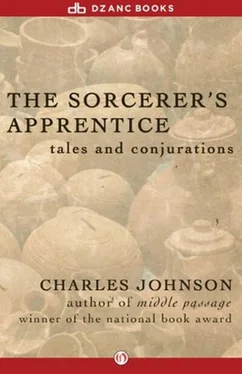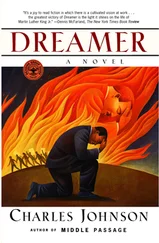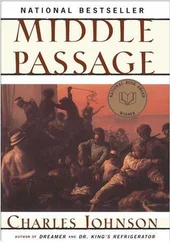Charles Johnson - Sorcerer's Apprentice
Здесь есть возможность читать онлайн «Charles Johnson - Sorcerer's Apprentice» весь текст электронной книги совершенно бесплатно (целиком полную версию без сокращений). В некоторых случаях можно слушать аудио, скачать через торрент в формате fb2 и присутствует краткое содержание. Год выпуска: 2014, Издательство: Dzanc Books, Жанр: Современная проза, на английском языке. Описание произведения, (предисловие) а так же отзывы посетителей доступны на портале библиотеки ЛибКат.
- Название:Sorcerer's Apprentice
- Автор:
- Издательство:Dzanc Books
- Жанр:
- Год:2014
- ISBN:нет данных
- Рейтинг книги:3 / 5. Голосов: 1
-
Избранное:Добавить в избранное
- Отзывы:
-
Ваша оценка:
- 60
- 1
- 2
- 3
- 4
- 5
Sorcerer's Apprentice: краткое содержание, описание и аннотация
Предлагаем к чтению аннотацию, описание, краткое содержание или предисловие (зависит от того, что написал сам автор книги «Sorcerer's Apprentice»). Если вы не нашли необходимую информацию о книге — напишите в комментариях, мы постараемся отыскать её.
Sorcerer's Apprentice — читать онлайн бесплатно полную книгу (весь текст) целиком
Ниже представлен текст книги, разбитый по страницам. Система сохранения места последней прочитанной страницы, позволяет с удобством читать онлайн бесплатно книгу «Sorcerer's Apprentice», без необходимости каждый раз заново искать на чём Вы остановились. Поставьте закладку, и сможете в любой момент перейти на страницу, на которой закончили чтение.
Интервал:
Закладка:
Hours later, when I came out of this drug coma, the building was full of daylight, quiet, the loud party long past. Things, no longer hazed, had a stylized purity of line. Was there more to come? Was I done? I wondered if I had dreamed the connectedness of Being the night before, or if now, awake, I dreamed distinctions. I didn’t know where I was for an instant. My bones felt loose, unlocked in my body. Through misty eyes I saw Wendy in an upholstered chair nearby, her arms around one brown knee, one bare foot on my briefcase, looking at me sadly, then away. I was twisted in covers on the mattress of a low bed, under a bare electric bulb, wearing only long flannel underwear limp from my sweat. Her bedroom was rayed by sunlight, cool as a basement. She sighed, a long stage sigh: “You poor fool.” Her voice was flat and tired. “You’re still thinking like a fat boy.” She pulled off her blouse, her skirt, her other boot, and threw her cigarette still burning into a corner. As she lay down, her cold feet flat against me, I lifted my arm to let her move closer, and at last let my mind sleep.
MOVING PICTURES
You sit in the Neptune Theater waiting for the thin, overhead lights to dim with a sense of respect, perhaps even reverence, for American movie houses are, as everyone knows, the new cathedrals, their stories better remembered than legends, totems, or mythologies, their directors more popular than novelists, more influential than saints — enough people, you’ve been told, have seen the James Bond adventures to fill the entire country of Argentina. Perhaps you have written this movie. Perhaps not. Regardless, you come to it as everyone does, as a seeker groping in the darkness for light, hoping something magical will be beamed from above, and no matter how bad this matinee is, or silly, something deep and maybe even too dangerous to talk loudly about will indeed happen to you and the others, before this drama reels to its last transparent, frame.
Naturally, you have left your life outside the door. Like any life, it’s a messy thing, hardly as orderly as art, what some call life in the fast lane: the Sanka and sugar-doughnut breakfasts, bumper-to-bumper traffic downtown, the business lunches, and a breakneck schedule not to get ahead but simply to stay in one place, which is peculiar, because you grew up in the sixties speeding on methadone and despising all this, knowing your Age (Aquarian) was made for finer stuff. But no matter. Outside, across town, you have put away for ninety minutes the tedious, repetitive job that is, obviously, beneath your talents, sensitivity, and education (a degree in English), the once beautiful woman — or wife — a former model (local), college dancer, or semiprofessional actress named Megan or Daphne, who has grown tired of you, or you of her, and talks now of legal separation and finding herself, the children from a former, fright-eningly brief marriage whom you don’t want to lose, the mortgage, alimony, 1RS audit, the aging, gin-fattened face that once favored a rock star’s but now frowns back at you in the bathroom mirror, the young woman at work born in 1960 and unable to recall John Kennedy who, after the Christmas party, took you to bed in her spacious downtown loft, perhaps out of pity because your mother, God bless her, died and left you with $1,000 in debt before you could get the old family house clear — all that shelved, mercifully, as the film starts, first that frosty mountaintop ringed by stars, or a lion roaring, or floodlights bathing the tips of buildings in a Hollywood skyline: stable trademarks in a world of flux, you think, surefire signs that whatever follows — tragedy or farce — is made by people who are accomplished dream merchants. Perhaps more: masters of vision, geniuses of the epistemological Murphy.
If you have written this film, which is possible, you look for your name in the credits, and probably frown at the names of the Crew, each recalling some disaster during the production, first at the studio, then later on location for five weeks in Oklahoma cow towns during the winter, which was worse than living on the moon, the days boiling and nights so cold. Nevertheless, you’d seen it as a miracle, an act of God when the director, having read your novel, called, offering you the project — a historical romance — then walked you patiently through the first eight drafts, suspicious of you at first (there was real money riding on this; it wasn’t poetry), of your dreary, novelistic pretensions to Deep Profundity, and you equally suspicious of him, his background in sitcoms, obsession with “keeping it sexy,” and love of Laurel and Hardy films. For this you wrote a dissertation on Derrida? Yet you’d listened. He was right, in the end. He was good, you admitted, grudgingly. He knew, as you — with your liberal arts degree — didn’t, the meaning of Entertainment. You’d learned. With his help, you got good, too. You gloated. And lost friends. “A movie?” said your poet friends. “That’s wonderful, it’s happening for you,” and then they avoided you as if you had AIDS. What was happening was this:
You’d shelved the novel, the Big Book, for bucks monitored by the Writers Guild (West), threw yourself into fast-and-dirty scripts, the instant gratification of quick deadlines and fat checks because the Book, with its complexity and promise of critical praise, the Book, with its long-distance demands and no financial reward whatsoever, was impossible, and besides, you didn’t have it anymore, not really, the gift for narrative or language, while the scripts were easy, like writing shorthand, and soon — way sooner than you thought — the films, with their life span shorter than a mayfly’s, were all you could do. It’s a living, you said. Nothing lasts forever. And you pushed on.
The credits crawl up against a montage of Oklahoma farm life, and in this you read a story, too, even before the film begins. For the audience, the actors are stars, the new Olympians, but oh, you know them, this one — the male lead — whose range is boundless, who could be a Brando, but who hadn’t seen work in two years before this role and survived by doing voice-overs for a cartoon villain in The Smurfs; that one — the female supporting role — who can play the full scale of emotions, but whose last memorable performance was a commercial for Rolaids, all of them; all, including you, fighting for life in a city where the air is so corrupt joggers spit black after a two-mile run; failing, trying desperately to keep up the front of doing-well, these actors, treating you shabbily sometimes because your salary was bigger than theirs, even larger than the producer’s, though he wasn’t exactly hurting — no, he was richer than a medieval king, a complex man of remarkable charm and cunning, someone both to admire for his Horatio Alger orphan-boy success and to fear for his worship at the altar of power. You won’t forget the evening he asked you to his home after a long conference, served you scotch, and then, from inside a drawer in his desk removed an envelope, dumped its contents out, and you saw maybe fifty snapshots of beautiful, naked women on his bed — all of them second-rate actresses, though the female supporting role was there, too — and he watched you closely for your reaction, sipping his drink, smiling, then asked, “You ever sleep with a woman like that?” No, you hadn’t. And no, you didn’t trust him either. You didn’t turn your back. But, then again, nobody in this business did, and in some ways he was, you knew, better than most.
You’d compromised, given up ground, won a few artistic points, but generally you agreed to the producer’s ideas — it was his show — and then the small army of badly paid performers and production people took over, you trailing behind them in Oklahoma, trying to look writerly, wearing a Panama hat, holding your notepad ready for rewrites, surviving the tedium of eight or nine takes for difficult scenes, the fights, fallings-out, bad catered food, and midnight affairs, watching your script change at each level of interpretation — director, actor — until it was unrecognizable, a new thing entirely, a celebration of the Crew. Not you. Does anyone suspect how bad this thing really looked in rough cut? How miraculous it is that its rags of shots, conflicting ideas, and scraps of footage actually cohere? You sneak a look around at the audience, the faces lit by the glow of the screen. No one suspects. You’ve managed to fool them again, you old fox.
Читать дальшеИнтервал:
Закладка:
Похожие книги на «Sorcerer's Apprentice»
Представляем Вашему вниманию похожие книги на «Sorcerer's Apprentice» списком для выбора. Мы отобрали схожую по названию и смыслу литературу в надежде предоставить читателям больше вариантов отыскать новые, интересные, ещё непрочитанные произведения.
Обсуждение, отзывы о книге «Sorcerer's Apprentice» и просто собственные мнения читателей. Оставьте ваши комментарии, напишите, что Вы думаете о произведении, его смысле или главных героях. Укажите что конкретно понравилось, а что нет, и почему Вы так считаете.












